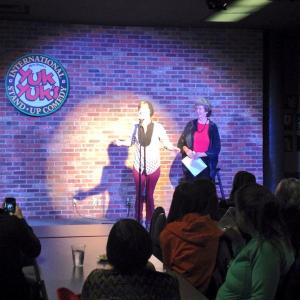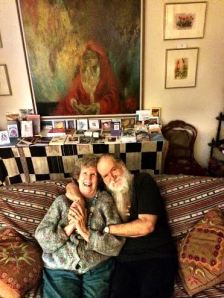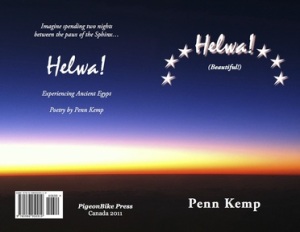The conversation is ongoing. The stories are breaking open. Thanks to the courage of so many women… and men.
SIOLENCE

In her biography of Elizabeth Smart, Rosemary Sullivan writes: “Every witness leaves gaps, deliberate or not. A biographer learns to listen between the words for the potent silences.” She describes how Elizabeth’s sister, cutting out some of the information in material she was sending, left Rosemary to wonder at that gap with a cryptic note: “Eat your heart out.”
But what if the biography is one’s own memoir? One’s own mind is then the site of potent silences to be examined: Mind the Gap. As Erin Mouré has said, the work is to decipher that anxiety, not to smooth it over too soon or to bury it.
Silence for me has been the background upon which my writing is figure. Writing is the arabesque back to recover what has been lost. Autobiographical fiction gives me permission to speak the obvious mysteries.
Robert Bly described a similar gap in his early book, appropriately called “The Silence of Snowy Fields’, as the denial of his father’s drinking. The gap is a wound for Bly — for me as woman that wound is womb, nest and family.
In the late seventies, I wrote a novel, FALLING TOWERS, which was short-listed for the Seal books award, but never published. In it, I could only deal obliquely with the topic of family violence and its effect on children. The scars and the fears were still too fresh for me to deal directly with this topic. There was a gap in the writing, a gulf in my consciousness that could not yet be leaped. It is only now that I have written the introductory pages that make sense of the rest of the novel, from which this excerpt:

SIOLENCE Part 2: Excerpted from Falling Towers
His fingers closed, blunt tips touching, the heels of the palms meeting, almost as in prayer. The hands ringing her throat, gold wedding ring pressing into her gullet. Even now, her body responded to the closeness of his, still dearly familiar and almost real. But she herself had already disappeared up the smoky trail, out the top of her head into the wide blue sky. Up there was a buzzing as of bees in the air, in the cool expanse. And a strange croak that seemed to have begun in her throat and travelled up with her into the wind. It was a croak; she was flying. She was a gull and free. Mewing, she hovered, opened her new eyes to glimpse the roof of their house, of all the houses, so puny from this height. They were five rows of little boxes nestled in a protective, billowing grove of trees along one edge of the Island. Beyond them, around her, the water sparkled, waiting, eternal.
Violent shaking startled her out of freedom: a sudden updraft, had she flown into a hurricane? She was being pulled back, down the vortex into a body she thought she had surrendered. The sound was in her ear, a roaring, carol, carol, but she heard no song. Nothing but Lyle’s voice, loud as Poseidon in a seashell. She swam now in an ocean of blood. Swirling red currents filled every cranny of her consciousness and this time she went under.
Cause and effect; events and who knew for sure what did happen. When she returned, the room was empty again but it too was swirling around her. It was an ordinary Island living room, filled with the brightly coloured booty of past travels: hangings and curtains and rugs. But now the Turkish reds and oranges, the Moroccan blacks of curtain danced a jig of molecules that confused her senses. She was lying on the couch, the one real piece of furniture they owned. At least it was steady. She shut her eyes again. She would not see.
She heard his footsteps, running closer. Water, soaking her head. She looked at him. A yellow cast of fear lay over the last red flare of rage on his face. But the hands that held the basin barely trembled. “If you’ve quite recovered,” Lyle declared, “I’ll head off to the city. Just take it easy, Carole. Is there anything we need? You’ll be all right.”
Irony of statement, concern or relief: it didn’t matter. The pain neatly divided her head from her shoulders. “I’ll be all right,” she attempted re-entry. “Just go.” Instead, her voice croaked. The words and the ability to make words had disappeared. And Lyle was already out the door. A flash of his yellow bike, and silence, except for the buzzing of wasps in her head.
What had it been about this time? How long? Could either of them remember? There was a complicity between them: nothing had happened. They could talk to no-one, certainly not each other, about the sudden black holes, the mine fields in ordinary conversation that would suddenly erupt. Because most of the time, they were not there. The house was simply a house, the scene domestic, cats and kids and cauliflower on the stove. Carole could talk to no one. She could not talk. When she tried, once, twice, her father reminded her of family pride, her friends reminded her their business was not to interfere. Not to know.
And where could she go anyway, on her own with two kids and no money and a body that would not move. Guilt, shame, Carole wrapped those qualities around her to keep warm, as if they were her own, protecting her from the eyes of neighbours, hiding the black and yellowing bruises under sleeves and stockings. What had she done? The dishes, drying in the sink. What had he done?
His fingers she had studied so closely, bald sentinels drumming up action. Beating to their own rhythm, the jazz that syncopated his every movement.
Next time. No, there would be no next time. There was never going to be a next time. This Carole believed on faith. This Lyle believed on faith. When he returned that night after the children were asleep, Lyle knew of course that he had changed, knew his rage had disappeared forever, as if it never was. Carole knew there was no such thing as fear. They held onto each other all night. Without a word.
Siolence Part 3 (Conclusion)
That story of violence was muffled because in the framework of the seventies it was not acknowledged to exist. That story I could not tell, because, as ground dissolves to figure, it did not exist in the positive noise of ordinary living. The action of violence upon articulation might best be expressed in a neologism: siolence.
Even in introducing a later book, BINDING TWINE, about losing custody of my children, I could not be direct. The blame, along with the mantle of silence, I still took on as my own. The root cause of violence I slipped in askance, in the middle of the forward, where it might not be noticed:
“This is the testimony the judge did not, could not hear… I have allowed myself to be victimized. I have learned. I do not allow myself to be victimized. I have learned. I do not allow myself to be victimized now. I take immediate action. I let nothing slip by. The central issue is passivity: how to break through the pattern of resignation, the sense of defeat and loss.
“For years I lived in a state of shock, driven out of my body. Yes, my pelvis split at the birth of each child. Yes, I was beaten and had nowhere to go. The effect was I could not grasp reality easily. I saw things as if I were a foot above myself, hands at the ends of long poles, ineffectual. Now, having worked through the terror, I am here, present, willing to face what comes. Willing to let this book out in the hope that it reaches others who have been where I have.
“One woman’s account to every woman, every person.”
Shell shocked. This is the gap into which I stuffed the memories I could not accept as real: eighteen months of clinging by a silent scream to life in a familial war zone. The body has a long memory and holds its fear long after it knows it should feel safe. I’m a writer and not easily squelched, and yet I was silenced for twenty years, by fear, by shame. Violence stuns; the mouth opens and after a while no scream emerges.
What can the experience of siolence be like for those who do not turn to language easily? As we find our own tongues, in turn we need to listen to others who are beginning to tell their stories. Encouragement is a safe place, a silence that is attentive and welcoming, so that all our stories may be heard. Let those bones speak.
Those of us who have experienced siolence recognize one other. There is a certain look in the eye (I wrote eve). A gingerness, as if we are still afraid to touch down. I prepare this piece at an adult education centre, while waiting to receive individual writers. Like calls to like.
The woman who hesitantly shows me her poem has written about gathering lovely flowers, red and blue, making the house beautiful once more with their scent. Her words describing the meadow are so light and airy that they feel unreal. To ground the writing, I ask her what might be behind the fantasy. “I had to escape,” she tells me. And the story she has never told pours out. “He beat on me. I could take that. But once he laid a hand on the kids, I got us out. I ran without a word.” And came back to school. She decides to write what happened in her marriage as her “Independent Study”. Stories swirl in our wake, till I am whisked off to the next class.
Penn Kemp (1992)
NOTE:
My essay on SIOLENCE was featured in the League of Canadian Poets’ Living Archives series:
Siolence: Poets on Women, Violence and Silence.
“Fifteen years ago the Feminist Caucus was created within the League of Canadian Poets to explore issues of gender, politics, family, memory, violence, language and poetry from a feminist
perspective. Siolence is the written result of this exploration…(The title is based on Penn’s neologism.)” Quarry Press, ISBN 1-55082-158-X, 120 pp, $16.95 Cdn, $10.97.
The essay is up on http://www.mytown.ca/siolence in three parts.
























